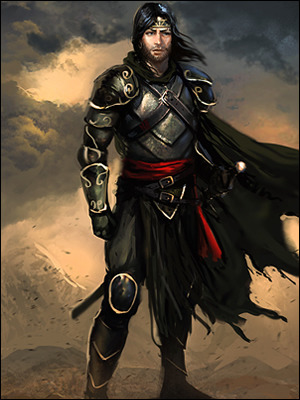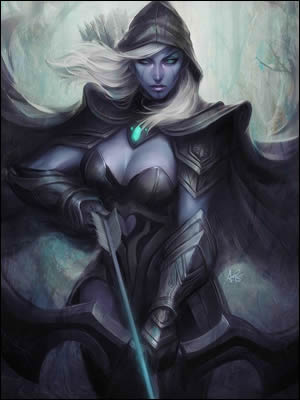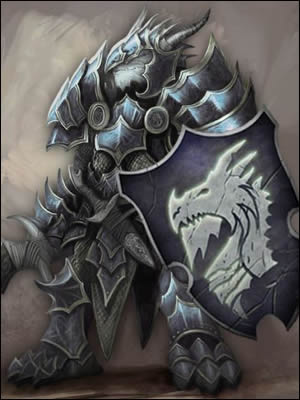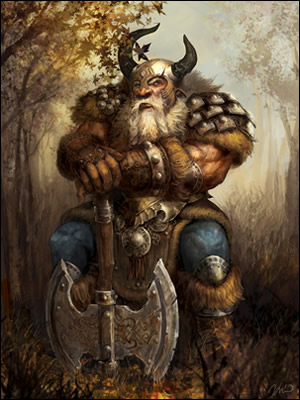Humans
 The most numerous and diverse race in the world, humans are also the rulers of the biggest and most powerful kingdom ever to exist - Asgard. They inhabit almost every corner of the world and are generally considered strong, agile, and smart. Their natural versatility allows them to specialize in any skill or even handle several at once. Ordinary humans have an average life span of 120 years, though exceptions have reached close to 160.
The most numerous and diverse race in the world, humans are also the rulers of the biggest and most powerful kingdom ever to exist - Asgard. They inhabit almost every corner of the world and are generally considered strong, agile, and smart. Their natural versatility allows them to specialize in any skill or even handle several at once. Ordinary humans have an average life span of 120 years, though exceptions have reached close to 160.
In Asgard, humans have proved to be conquerors and overlords above all else. Their kingdom has expanded over the territory of others through both diplomacy and force, and endured for centuries unchallenged. Though human rulers officially claim to view other races as equals, practice has shown that they think of themselves as superiors to most. A long tradition of friendship exists between humans and Shadow Elves, their greatest allies. Though often courageous, valiant, and loyal, human hearts are just as prone to corruption. Many betrayed their own kind during the Great War to join the enemy, driven by greed and fear.
It is not certain from where exactly humanity originated. In Asgard, their presence is heavily centralized in Hyerald though they inhabit all parts of the kingdom. The capital city of Alicante is the largest and most impressive settlement on the continent. The mainstream religion among humans is Creationism; belief in a single God often referred to as the Maker.
There exist three human subtypes on the continent: the Frigid Folk, the Varden, and the Kossar.
Shadow Elves
 The Shadow Elves were the first race to inhabit the continent. They are tall and dark people, with purple-blue skin and white irises that over time shift to grey and ultimately black. Elves are respected for their intelligence and feared for their cunning nature. They excel at both bow and blade, favoring stealth and tactics over brute force. Once they reach maturity at 30, Shadow Elves seemingly stop aging - but they are not immortal. Their average lifespan is around 300 years, with some going as far as 350.
The Shadow Elves were the first race to inhabit the continent. They are tall and dark people, with purple-blue skin and white irises that over time shift to grey and ultimately black. Elves are respected for their intelligence and feared for their cunning nature. They excel at both bow and blade, favoring stealth and tactics over brute force. Once they reach maturity at 30, Shadow Elves seemingly stop aging - but they are not immortal. Their average lifespan is around 300 years, with some going as far as 350.
Once, elven settlements spanned Asura, as they call the continent, until the arrival of the Drakkar from the South. This was the beginning of the end of their dominance. Even many centuries later, there is still resentment between elves and the other races, whom some still view as intruders. The exception are humans, who arrived when the elven kingdom was already in ruins. The two races have built a strong relationship since. This was always apparent in the kingdom of Asgard, where elves are the only race truly treated as human equals.
Shadow Elves originally worshiped Ashura, the goddess of nature, but today their beliefs are split roughly evenly between Ashura and the Maker, with some choosing to believe in both. Elves live throughout Asgard, but mostly along the western shore. The architecture of their cities embraces nature, seeking to adapt to it rather than the other way around.
There is an old subdivision of Shadow Elves known as Mist Elves.
Drakkar
 Said to be descendant from dragons themselves, these reptilian creatures are proud, bulky, and aggressive by nature. The Drakkar are equally famous for their skill at the forge as they are infamous for their brutality in combat. They prefer heavy weapons and heavier armor, taking advantage of their strength to make use of equipment a human could barely lift. Average life expectancy of the Drakkar is about 450 years, with exceptions achieving almost 500.
Said to be descendant from dragons themselves, these reptilian creatures are proud, bulky, and aggressive by nature. The Drakkar are equally famous for their skill at the forge as they are infamous for their brutality in combat. They prefer heavy weapons and heavier armor, taking advantage of their strength to make use of equipment a human could barely lift. Average life expectancy of the Drakkar is about 450 years, with exceptions achieving almost 500.
The Drakkar arrived to Asgard from the South over two thousand years ago, and immediately attacked the Shadow Elves who were not prepared for their onslaught. Within a short time, the entire southern part of the continent was overtaken. Their plans for complete domination were only ruined because of the arrival of the humans who quickly allied with the elves and halted the invaders. Asgard's power only grew from there, and eventually it became enough to defeat the Drakkar in a long and bloody war at the end of which their realm was annexed by the rising kingdom. Despite their troublesome nature and inborn resentment towards the other races, the Drakkar eventually managed to get a seat on the Royal Council, officially becoming equals. Because of their longevity there are still members of the race who were alive during the Drakkar Wars - and they keep the memory of their independence burning in their hearts.
Few Drakkar have come to believe in the Maker. Most are atheist, while some still worship their old chaotic dragon gods - though the dragon cults are officially banned because of their hostility and ties to Blood Magic. During the Great War, many of these secret warlocks stepped forth to fight for the Sorceress, revering her as a vanguard prophet of their demonic deities.
Dwarves
 The Dwarves were the last race to discover Asgard. They are most akin to humans except that they're lower and broader. Dwarves make strong warriors and skilled craftsmen; most famous for their stonework and runic enchantments. Dwarves maintain a neutral policy towards the other races, caring mostly about their own secluded kingdom. Their average life expectancy is 350 years, with some living up to 400.
The Dwarves were the last race to discover Asgard. They are most akin to humans except that they're lower and broader. Dwarves make strong warriors and skilled craftsmen; most famous for their stonework and runic enchantments. Dwarves maintain a neutral policy towards the other races, caring mostly about their own secluded kingdom. Their average life expectancy is 350 years, with some living up to 400.
When the Dwarves arrived to the continent, the kingdom of Asgard was just in the making and Humans and Shadow Elves were already locked in war with the Drakkar. The Dwarves saw this as an opportunity to claim a small piece of land uncontested, arguing that no one lived there anyway. They settled in the Fangír Mountains and built an elaborate and well fortified civilization within - The Kingdom of Knalga. Having finally defeated the Drakkar in the south, Asgard turned its attention north, to the riches of Knalga - even weakened as it was, Asgard still posed an overwhelming threat. But in order to avoid a long and bloody siege, a peaceful solution was made; Knalga officially became part of Asgard, and in return it was allowed to maintain its own inner politics as well as a representative monarch. This did not sit well with many Dwarves, and centuries later in the Great War Ilhirel easily persuaded the Knalgan King and the majority of his people to join her, causing a civil war that tore the Dwarven kingdom apart.
Dwarves mainly worship the Seven; a group of ancient dwarves who are revered as the founders of their kingdom and race. These paragons are still represented today by the descendants of those seven families.

In Asgard, humans have proved to be conquerors and overlords above all else. Their kingdom has expanded over the territory of others through both diplomacy and force, and endured for centuries unchallenged. Though human rulers officially claim to view other races as equals, practice has shown that they think of themselves as superiors to most. A long tradition of friendship exists between humans and Shadow Elves, their greatest allies. Though often courageous, valiant, and loyal, human hearts are just as prone to corruption. Many betrayed their own kind during the Great War to join the enemy, driven by greed and fear.
It is not certain from where exactly humanity originated. In Asgard, their presence is heavily centralized in Hyerald though they inhabit all parts of the kingdom. The capital city of Alicante is the largest and most impressive settlement on the continent. The mainstream religion among humans is Creationism; belief in a single God often referred to as the Maker.
There exist three human subtypes on the continent: the Frigid Folk, the Varden, and the Kossar.
- Frigid Folk
These humans have adapted to life in the coldest regions of North Asgard. They are tall but thin people, pale of skin and usually hair as well. Due to their natural habitat, they are mainly carnivorous and sport teeth adapted to ripping and tearing rather than grinding. Their eyes are able to cope with extremes of light and dark. The Frigid Folk are cold towards outsiders and most live out their whole lives without ever leaving the Frigid Wastes. They are also Asgard's greatest scholars, responsible for world-shaping inventions.
- Varden
An ancient race of humans originating from a faraway, lost realm that now claims a small, independent kingdom in the continent's northeast corner. The Varden are alike the humans of Hyerim, but tend to be heavier in stature. They are a proud, just nation, low in numbers and born with natural affinity for magic. The biggest difference between the Varden and other humans is their unusually long life span; about 700 years. The isolated Varden Kingdom managed to avoid being conquered by Asgard mostly thanks to the Wilderness, a wide stretch of untamed land that lies between the two, filled with savage beasts and other dangers. During the Great War, the Varden recognized the importance of stopping the Sorceress and joined Asgard on the battlefield, albeit to no avail.
- Kossar
A curious race that is the result of many lifetimes of the Mist Elves and humans living side by side in East Asgard, until at some point they melded into one. They are tall and broad people, with wildly growing hair and pointed ears. The Kossar have a finely honed sense of honor and justice, and there are none in all of Asgard that hold on to their oaths more seriously. Due to their elven heritage, the life span of Kossar is slightly longer than that of the humans of Hyerim - averaging about 180. The Kossar used to live in a league of seven city-states known as the Kossariat League. During the Great War, when the enemy had all but won, the Kossar burned their own cities rather than see them fall to the Sorceress. Since then the Kossariat League has ceased to exist, though the nation itself still survives, waging guerrilla warfare in the east despite their diminished numbers.
Shadow Elves

Once, elven settlements spanned Asura, as they call the continent, until the arrival of the Drakkar from the South. This was the beginning of the end of their dominance. Even many centuries later, there is still resentment between elves and the other races, whom some still view as intruders. The exception are humans, who arrived when the elven kingdom was already in ruins. The two races have built a strong relationship since. This was always apparent in the kingdom of Asgard, where elves are the only race truly treated as human equals.
Shadow Elves originally worshiped Ashura, the goddess of nature, but today their beliefs are split roughly evenly between Ashura and the Maker, with some choosing to believe in both. Elves live throughout Asgard, but mostly along the western shore. The architecture of their cities embraces nature, seeking to adapt to it rather than the other way around.
There is an old subdivision of Shadow Elves known as Mist Elves.
- Mist Elves
The origins of the Mist Elves are unknown. What is known is that they inhabited the far eastern shores of the continent, and that they slowly but surely melded with the humans who arrived there later. The resulting race, Kossar, is considered more human than elven in nature. Some Mist Elves are believed to have fled the continent when it became apparent that the elven dominion was nearing its end. Supposedly they sailed across the ocean to the east, where they might still survive.
Drakkar

The Drakkar arrived to Asgard from the South over two thousand years ago, and immediately attacked the Shadow Elves who were not prepared for their onslaught. Within a short time, the entire southern part of the continent was overtaken. Their plans for complete domination were only ruined because of the arrival of the humans who quickly allied with the elves and halted the invaders. Asgard's power only grew from there, and eventually it became enough to defeat the Drakkar in a long and bloody war at the end of which their realm was annexed by the rising kingdom. Despite their troublesome nature and inborn resentment towards the other races, the Drakkar eventually managed to get a seat on the Royal Council, officially becoming equals. Because of their longevity there are still members of the race who were alive during the Drakkar Wars - and they keep the memory of their independence burning in their hearts.
Few Drakkar have come to believe in the Maker. Most are atheist, while some still worship their old chaotic dragon gods - though the dragon cults are officially banned because of their hostility and ties to Blood Magic. During the Great War, many of these secret warlocks stepped forth to fight for the Sorceress, revering her as a vanguard prophet of their demonic deities.
Dwarves

When the Dwarves arrived to the continent, the kingdom of Asgard was just in the making and Humans and Shadow Elves were already locked in war with the Drakkar. The Dwarves saw this as an opportunity to claim a small piece of land uncontested, arguing that no one lived there anyway. They settled in the Fangír Mountains and built an elaborate and well fortified civilization within - The Kingdom of Knalga. Having finally defeated the Drakkar in the south, Asgard turned its attention north, to the riches of Knalga - even weakened as it was, Asgard still posed an overwhelming threat. But in order to avoid a long and bloody siege, a peaceful solution was made; Knalga officially became part of Asgard, and in return it was allowed to maintain its own inner politics as well as a representative monarch. This did not sit well with many Dwarves, and centuries later in the Great War Ilhirel easily persuaded the Knalgan King and the majority of his people to join her, causing a civil war that tore the Dwarven kingdom apart.
Dwarves mainly worship the Seven; a group of ancient dwarves who are revered as the founders of their kingdom and race. These paragons are still represented today by the descendants of those seven families.
Last edited:

